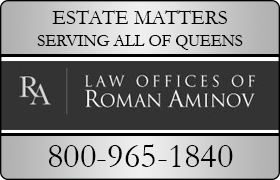Sunnyside Real Estate Lawyer, New York, page 2
Sponsored Law Firm
-
 x
x

Click For More Info:
-
The Law Offices of Roman Aminov
147-17 Union Turnpike Flushing, NY 11367 » view mapElder Law, Probate, Estate Planning Free Inital Phone Consultation
The Law Offices of Roman Aminov is a client centric trusts and estates practice concentrating in estate planning, elder law, and probate.
800-965-1840  Roman Aminov
Flushing, NY
Roman Aminov
Flushing, NY Attorney At Law - New York, 2011
 Testimonials
Testimonials"Roman went out his way to help me. He made several attempts to contact me."
 Contact UsEmail or Call 24/7
Contact UsEmail or Call 24/7Call for free initial consultation,
800-965-1840.
Marc Damien Sean Taylor
✓ VERIFIEDMarc Taylor is a practicing attorney in New, York. He handles all phases of immigration, primarily including corporate and family immigration, permane... (more)
Keith A. Gilman
✓ VERIFIEDKeith Gilman grew up in Queens County, New York. He attended Hunter College High School in Manhattan, where he lettered in baseball and bowling. Mr. G... (more)
Courtney Davy
✓ VERIFIEDCourtney Davy proudly served his country as a member of the United States Marine Corps before receiving his Bachelor's and Juris Doctorate degrees. Co... (more)
Russel Morgan
✓ VERIFIEDRussel Morgan is a practicing lawyer in the state of New York.
Kent Gross
✓ VERIFIEDKent Gross is a practicing lawyer in the state of New York. Mr. Gross received his J.D. from the University of California Los Angeles School of Law.
FREE CONSULTATION
CONTACTJacob M. Dyckman
FREE CONSULTATION
CONTACT

 Testimonials
Testimonials Contact UsEmail or Call 24/7
Contact UsEmail or Call 24/7







